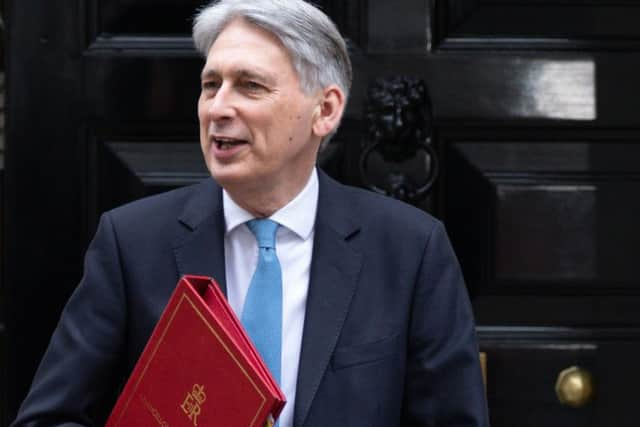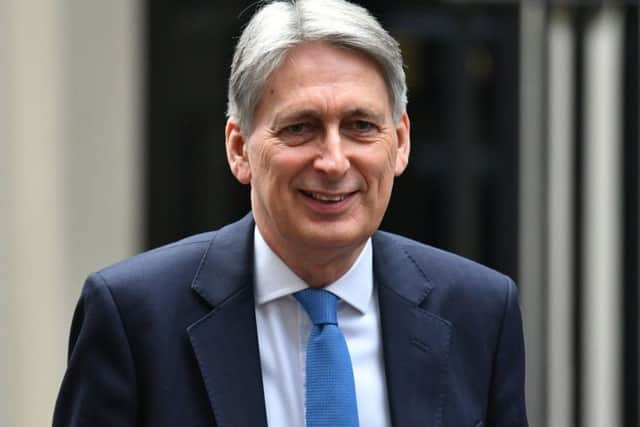Spring Statement: MPs warned £26bn war chest at risk over Brexit deal wrangling
Delivering a Spring Statement overshadowed by the uncertainty gripping the UK, Mr Hammond hinted that he believed there should be a cross-party compromise to ensure a softer Brexit is reached.
Better-than-forecast borrowing figures allowed Mr Hammond to add another £11 billion to his fiscal “headroom”, building up a £26bn “war chest” to prepare for Brexit. The Chancellor said he would launch a spending review covering the next three years if a deal is agreed, deploying that headroom as a “deal dividend” to boost public spending. But he warned that under a no-deal scenario, much of it could disappear as the government scrambles to respond to the impact of crashing out of the EU.


Advertisement
Hide AdAdvertisement
Hide AdAfter Theresa May’s deal was rejected for the second time on Tuesday night, Mr Hammond said the economy was “fundamentally robust” but pleaded with MPs to lift the “uncertainty” that “hangs over” the UK because of the no-deal threat.
“We cannot allow that to continue: it is damaging our economy and it is damaging our standing and reputation in the world,” Mr Hammond said.
Looking ahead to tonight’s votes on whether to extend Article 50 and delay Brexit, he added: “We will have the opportunity to start to map out a way forward – to exit the EU in an orderly way to a future relationship that will allow Britain to flourish.”


Mr Hammond warned that economic progress will be “at risk” without a smooth and orderly exit from the EU, but said he was “confident” MPs would reach agreement “over the coming weeks”.
“Leaving with a no-deal would mean significant disruption in the short and medium-term and a smaller, less prosperous economy in the long term,” Mr Hammond said. “Higher unemployment, lower wages, higher prices in the shops – that is not what the British people voted for in June 2016.”
A Treasury source insisted Mr Hammond supports the Prime Minister’s deal, saying: “He has been very clear that he supports the PM’s deal but he has also been saying for months that compromise is how we get through this and he is calling for compromise.”
Mrs May’s official spokesman said the Prime Minister is not proposing a series of indicative votes to establish MPs’ preferred outcome.
Forecasts from the Office of Budget Responsibility (OBR) based on the UK leaving the EU with a deal predict continued economic growth over the next five years.
Advertisement
Hide AdAdvertisement
Hide AdHowever, the OBR said there would be lower GDP growth this year of 1.2 per cent, compared with 1.6 per cent forecast at the Budget in October.
The UK is forecast to create another 600,00 new jobs by 2023, and the OBR said wages would rise by at least 3 per cent each year. The Scottish Government’s public finance minister Kate Forbes said £1.3bn in new investment announced by the Chancellor was a “drop in the ocean” when the UK is faced with significant economic headwinds from Brexit.
“Years of austerity and continued uncertainty at the hands of the UK government is impacting on business investment in Scotland and causing unnecessary harm to some of the poorest and most vulnerable in society,” Ms Forbes said.
“Today was the Chancellor’s opportunity to change this and he chose not to, despite recognising the damaging consequences of the UK’s EU exit and the fact he had additional resources to invest now.
“The plans he set out today will be a drop in the ocean compared to the harm that EU exit will cause, with business investment already falling and growth expected to slow.”
Shadow Chancellor John McDonnell accused Mr Hammond of a “calamitous” response to the risk of no-deal Brexit.
He said: “Even today, the Chancellor has tried to use the bribe of a deal double dividend or threat of postponing the spending review to cajole MPs into voting for the government’s deal. This is a calamitous strategy.”
